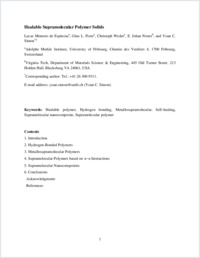Healable Supramolecular Polymer Solids
- Montero de Espinosa, Lucas Adolphe Merkle Institute, University of Fribourg, Switzerland
- Fiore, Gina L. Adolphe Merkle Institute, University of Fribourg, Switzerland
- Weder, Christoph Adolphe Merkle Institute, University of Fribourg, Switzerland
- Foster, E. Johan Virginia Tech, Department of Materials Science & Engineering, Blacksburg, VA 24061, USA
- Simon, Yoan C. Adolphe Merkle Institute, University of Fribourg, Switzerland
-
2015
Published in:
- Progress in Polymer Science. - 2015, vol. 49-50, p. 60-78
English
The reversible nature of non-covalent interactions between constituting building blocks permits one to temporarily disassemble supramolecular polymers through the application of an appropriate external stimulus “on command”. This framework has recently emerged as a general design strategy for the development of healable polymer systems. The approach exploits that the temporary disassembly decreases the molecular weight and in the case of cross-linked polymers the cross-link density, and thereby causes an increase of the chain mobility and a reduction of the viscosity of the material. The transformation thus enables the disassembled material to flow and fill defects, before the original supramolecular polymer is re-assembled. Focusing on recent progress in the area of healable supramolecular polymer solids based on hydrogen-bonding, metal-ligand and π–π interactions, as well as supramolecular nanocomposites, this review article summarizes the development and current state of the field.
- Faculty
- Faculté des sciences et de médecine
- Department
- AMI - Chimie des polymères et matériaux
- Language
-
- English
- Classification
- Chemistry
- License
-
License undefined
- Identifiers
-
- RERO DOC 258948
- DOI 10.1016/j.progpolymsci.2015.04.003
- Persistent URL
- https://folia.unifr.ch/unifr/documents/304660
Statistics
Document views: 126
File downloads:
- Texte intégral: 678
